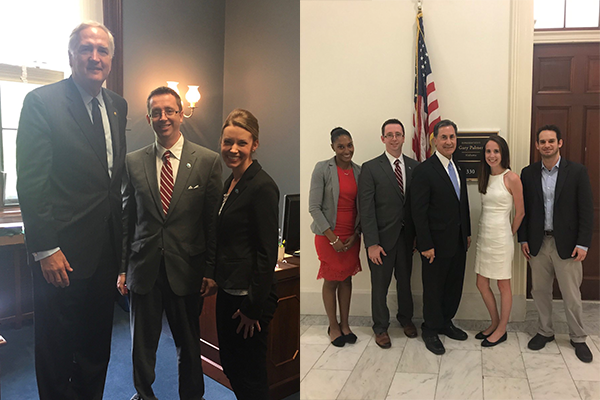MotionMobs attended ACT’s App Economy Conference in Washington, D.C., this week to help tell our story as a small tech company and speak about how policy impacts us. As a professional services company, we also attended to speak on behalf of our clients, who run tech businesses based on the apps we build for them.
We had a chance to meet ACT’s staff members who speak up for companies like MotionMobs all year long and meet tech entrepreneurs from all across the country. About 80 percent of app developers are outside of Silicon Valley, which was evident based on the companies in attendance. Conference participants make up a vibrant tech community in every corner, from Oregon to Florida and from Arizona to New York.
Monday consisted of briefings on the variety of topics we might be asked to discuss in our meetings the next day. While bills dealing directly with these issues come up for a vote from time to time, the issues are pretty persistent ones with no quick solutions. Here are a few of the topics we discussed.
Computer Science Education
There are more than 500,000 open technical jobs in our country. The lack of sufficient training in schools to prepare students to take these jobs is starting to take a toll on tech companies in all states. Only one in four K-12 students has access to computer science, and even then, it’s not always high quality tech education. As all sectors of our economy are transitioning into the digital space, it’s essential the next generation receives the training they need to participate.
Cybersecurity
While jokes abound from the most recent election about “the cyber,” cybersecurity is no joke. The tech sector and law enforcement agencies have to cooperate and understand they are on the same side. Stronger encryption standards keep consumers safer and cut down on the number of digital crimes. There is no such thing as a secret backdoor to break through encryption that only one department or agency can ever get through. If the “good guys” can get the keys, so can the bad actors.
Intellectual Property
Generally speaking, intellectual property consists of copyrights, patents, trademarks, and trade secrets. These are assets to tech companies and need to be protected accordingly to protect the value of the company. Copyright protects works of authorship, patents protect inventions, trademarks protect brands, and trade secrets protect methods and processes.
Our clients frequently ask us about the best way to protect the apps they’re building, and the most common protections our clients think they need are nondisclosure agreements and patents. In reality, the vast majority of our clients would most benefit from a trademark, and even trade dress. It’s rare that we get pitched a truly inventive workflow or technical process that is fitting of a patent, and we agree with this Forbes’ article‘s summary of NDAs. A trademark protects your new company’s name, logo, and/or slogan. Trade dress complements a trademark in the situation of an app because it protects the colors, styles, and general look, all of which define your app as, well, your app.
Technology protected by patents also must be licensed fairly and without discrimination to allow innovation to move forward. This fairness is referred to as FRAND (fair, reasonable and non-discriminatory) and allows patent holders to profit while providing access to standard technology to any company that needs it. When small companies seeking reasonable use are abused by a powerful patent holder, the small companies simply cease to exist. It’s essential to protect companies without billion-dollar bank accounts that seek to build upon other standard technologies.
Lawful Access
Laws written for printed documents clearly don’t fit the nature of data. A warrant is required to obtain a printed document, but the law currently allows for a simple subpoena to demand access to digital data. There also aren’t any clear laws that determine what laws stand internationally when a company, the client, and the data may be in separate countries. International tech companies may be forced to simultaneously comply with one country’s laws while breaking a law in a foreign country. The laws must be updated to reflect the global nature of digital data.
Capitol Hill Meetings

On Tuesday we each had an individualized schedule of meetings to attend to talk with a wide variety of offices on Capitol Hill. MotionMobs met with staffs of each of the elected officials that serve Birmingham: Senator Richard Shelby, Senator Luther Strange (left photo), Representative Gary Palmer (right photo), and Representative Terri Sewell. We also met with House and Senate Committees on Commerce, Judiciary, Consumer Protection, Transportation, Science, and more.
We sincerely thank all of the policy makers who took the time to listen to the issues that are important to us as a technology company and as residents of Alabama. We also offer a big thank you to the team at ACT for all of their hard work to coordinate the 100+ meetings that participants attended on Capitol Hill during the conference. We look forward to returning next year!
